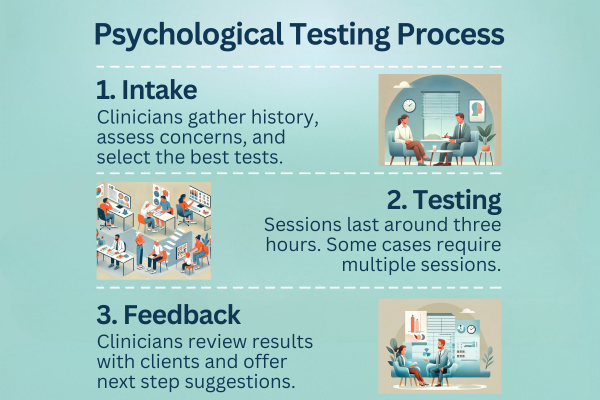Psychological Testing is Not Like Therapy: A Breakdown of the Process
By Jason Sikkema, MA, MLP
Psychological testing is a service proudly offered at Meredith Psychological and Testing Services. Our clinicians are trained in a wide variety of testing assessments intended to answer many kinds of client referral questions. Clients may be referred for testing by doctors’ offices, therapists at Meredith Psychological and Testing Services, other therapists in the communities we serve, or by clients asking directly for these services themselves.
Psychological testing may help clients in many ways. For example, testing results may be helpful for gaining accommodations at school, such as Individualized Education Plans (IEPs) or 504 Plans. Another benefit from testing is that it may help therapists, psychiatrists, or primary care providers gain insight into effective treatments to address their clients’ concerns. Additionally, many clients find peace of mind by gaining a better understanding of symptoms and behaviors that can be difficult to explain to others.
Testing can evaluate many potential diagnoses. One of the most common reasons for testing referrals is to examine the possibility of attention-deficit/hyperactivity disorder (ADHD) in children, teens, and adults. Another frequent referral reason is to evaluate possible intellectual deficits or specific learning disorders. Referral questions may also be concerned with determining the possibility of autism spectrum disorder (ASD). Additionally, clarification regarding possible diagnoses, existing diagnoses, or second opinions are more reasons clients may seek testing.
The testing process itself is very different from traditional therapy. That is, testing has a clear beginning, middle, and end. The beginning is the initial intake interview, the middle is the testing itself, and the end is the feedback session. The amount of time each step takes depends on the clinician’s personal style and the complexity of the referral question. The following paragraph breaks this process down even more.
Once a referral for testing is received, the first step is scheduling an initial intake interview. The length of the intake appointment depends on the clinician’s style, but it will generally last between one and three hours. This first appointment is scheduled for longer than a traditional therapy hour because of all the information that needs to be collected. During this intake appointment, the clinician has to gather a comprehensive history of a client’s concerns and symptoms. The clinician also needs to collect background information regarding a client’s family, developmental, medical, psychological, trauma, educational, work, legal, and substance use history. A solid testing battery consisting of specific tests and measures intended to answer each client’s referral question is impossible to develop without a good grasp of each client’s unique history.
During the intake interview, the clinician will also need clients to complete releases of information. This is a key step, because collecting information from a client’s family members, teachers, therapist, or doctor may be an essential component in answering a client’s referral question. It is important to note that a clinician may not legally contact anyone without the client’s permission.
The second step in the testing process is the testing itself. The number of testing sessions required is determined by each client’s referral question. For example, a client seeking a better understanding of a possible diagnosis may only need one testing appointment, while a client wanting to investigate possible learning problems may require two or three testing sessions. Testing sessions are typically scheduled in three-hour blocks. The length of the appointments may be adjusted to each client’s needs. The length of the testing appointments is set to accommodate the amount of time needed to complete the testing measures themselves.
Once all of the testing is complete, the clinician begins the feedback portion of the process. First, the clinician scores the tests. Second, they integrate the test data into a report. The integration and interpretation puts the client’s test data in context with their initial intake information. Third, based on all the available information, the clinician determines diagnoses. Finally, they generate specific recommendations tailored to each client’s needs. Once the report is finalized, the clinician will review the results with each client during the feedback session. At this time, clients are invited to ask clarifying questions and are provided with follow-up resources for further support.
After the feedback session occurs, the clinician provides the client with a copy of their report. They may also forward the report to therapists, doctors’ offices, or schools. This is another reason the client needs to sign releases of information. Without the releases of information on file, the clinician cannot legally share any of the results with other providers. Once the final report is sent out, the testing process is complete, and the clinician closes out the client’s testing file.
If you or someone you care about is interested in psychological testing, it is best to call an organization that does it as soon as possible. Due to increasing demand, it is an unfortunate side effect that you may encounter a waitlist. Please be patient, as the benefits of testing are worth the wait. Also, insurance companies can be particular with what they allow for psychological testing. You may need to call a few different places to find out where you can use your coverage.



